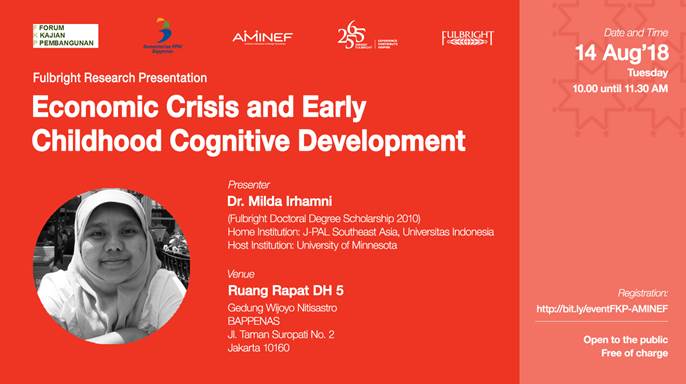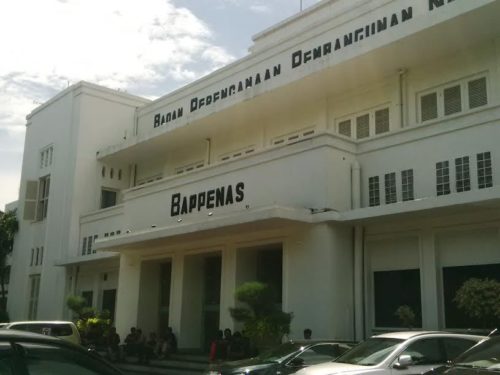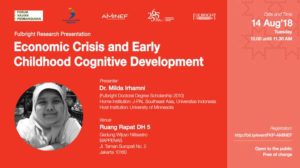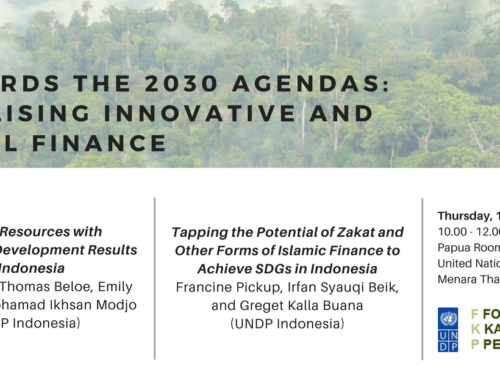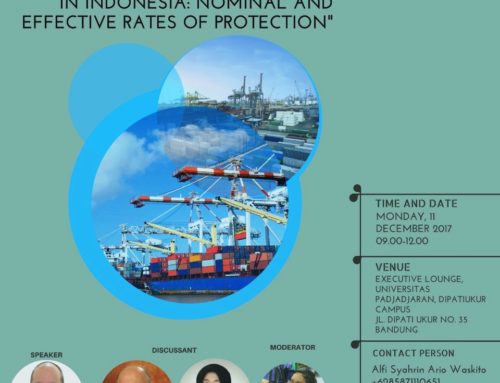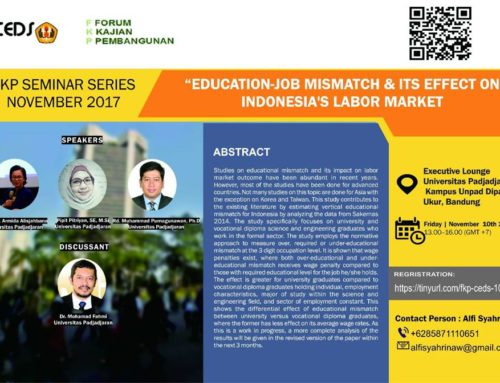The FKP host for August 2018 is the Ministry of National Development Planning/National Development Planning Agency (BAPPENAS), and the detailed program can be found below.
Please register through the link provided for each event, to enable BAPPENAS to plan for your attendance.
Tuesday, 14 August 2018, 10.30–11.30 WIB
Ruang Rapat DH 5, Gedung Wijoyo Nitisastro, BAPPENAS, Jl. Taman Suropati No. 2, Jakarta
Economic Crisis and Early Childhood Cognitive Development
Milda Irhamni (J-PAL Southeas Asia)
Abstract: An extensive literature generally agrees that early childhood development can have lasting impacts on adulthood outcomes. Because skills are shaped by both genetic factors and choices, investments in the early years of childhood can be important determinants for adult outcomes. Furthermore, child development research also shows that there are sensitive periods in a child’s life for the development of their skills. This study estimates the impact of the 1997 East Asian Financial Crisis on the cognitive skills of children in Indonesia. Due to the paucity of data, there have been few studies focusing on child cognitive skills in Indonesia. This essay tries to address this by using the rich data from the Indonesian Family Life Survey (IFLS). Consistent with previous research, the negative impacts of the crisis on early childhood cognitive development are mostly felt by children in urban areas. If we differentiate between the stages of early childhood development, the impacts of the crisis appear to be most detrimental when the children are exposed to the crisis in utero.
Registration: https://fkp20180814.eventbrite.com
—
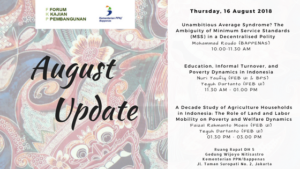
Thursday, 16 August 2018, 10.00-11.30 WIB
Ruang Rapat DH 5, Gedung Wijoyo Nitisastro, BAPPENAS, Jl. Taman Suropati No. 2, Jakarta
Unambitious Average Syndrome? The Ambiguity of Minimum Service Standards (MSS) in a Decentralised Polity
Mohammad Roudo (BAPPENAS)
Abstract: How can performance management influence public sector agencies to improve their performance? This question has long been the subject of intense discussion among scholars It is often the case that public sector units have no motivation to improve beyond the minimum level required to stay safe and can also result in unambitious average syndrome. A similar phenomenonpotential to arise with the introduction of the Minimum Service Standards (MSS) for local authorities within Indonesia’s decentralised system.Through the decentralisation policy, which was launched in 1999, the central government has devolved most public service decision-making to local authorities. Thus, instead of a set target or rank for local government, MSS was introduced as a form of compromise between the central and local governments in relation to the minimum quality of services in health and education that should be delivered by local governments. This paper attempts to assess the influence of public sector performance management on the motivation of local public-sector agencies to improve their performance. either above or well below the standards.
Registration: https://fkp20180816a.eventbrite.com
—
Thursday, 16 August 2018, 11.30–13.00 WIB
Ruang Rapat DH 5, Gedung Wijoyo Nitisastro, BAPPENAS, Jl. Taman Suropati No. 2, Jakarta
Education, Informal Turnover, and Poverty Dynamics in Indonesia
Nuri Taufiq (FEB UI & BPS) dan Teguh Dartanto (FEB UI)
Abstract: Two main characteristics of Indonesian labor market are a high presence of informal workers and unskilled (low education) workers that contribute around 58.35% of workers in 2017. These two characteristics of workers are highly associated with vulnerability and poverty incidence. Moreover, many studies on poverty dynamics as well as welfare mobility have highly emphasized education attainment as an important factor of moving out of poverty. However, the link how education can influence poverty has not been deeply explored. One of mechanisms is through labor market. Theoretically, those having a higher education level would have a higher chance to be hired in formal jobs that provide a better income. This would enable them to move out of poverty. This study then aims at analyzing the effect of education on the mobility of employment from informal workers to formal workers (informal turnover) as well as its effect on the poverty dynamics in Indonesia.
Registration: https://fkp20180816b.eventbrite.com
—
Thursday, 16 August 2018, 13.30–15.00 WIB
Ruang Rapat DH 5, Gedung Wijoyo Nitisastro, BAPPENAS, Jl. Taman Suropati No. 2, Jakarta
A Decade Study of Agriculture Households in Indonesia: The Role of Land and Labor Mobility on Poverty and Welfare Dynamics
Faizal Rahmanto Moeis dan Teguh Dartanto (FEB UI)
Abstract: The economic conventional wisdom stated by Arthur Lewis in his dual sector theorem says that people that work in the agriculture (traditional) sector that move out to non-agriculture (modern) sector will be better off due to the modern sector having higher productivity. This also applies to farmland as farmland should be reinvested into capital that gives higher returns. In Indonesia, the number of agriculture workers have continually decreased in the last decade. This process is also accompanied by the decrease of average farmland ownership of households. These two phenomena show that the farmers are completely leaving agriculture sector and in hand with Lewis’s theorem. However, can we guarantee they are better off? Observing the last three waves of IFLS (Indonesia Family Life Survey) and applying the poverty line of $3.2 PPP/capita/month the researchers investigate the factors that influence poverty and welfare dynamics of agriculture household.
Registration Registrationhttps://fkp20180816c.eventbrite.com
*Picture of BAPPENAS building from this source
